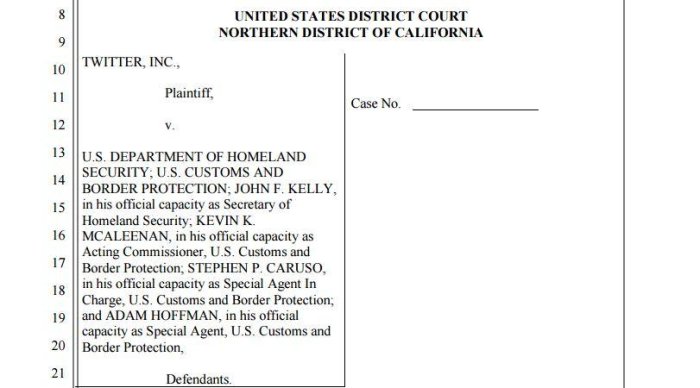
April 7 (UPI) -- Social media giant Twitter filed a lawsuit Thursday that claims President Donald Trump's administration demanded the identity of a user who's been highly critical of the federal government.
The suit, filed in U.S. District Court in California on Thursday, names a consortium of defendants -- including the U.S. Department of Homeland Security, Customs and Border Protection, Homeland Security Secretary John F. Kelly, CBP acting chief Kevin McAleenan and two CBP special agents.
According to Twitter, the federal government had issued a summons for the identity of the user @ALT_USCIS -- which has been critical of the U.S. Citizenship and Immigration Services agency (USCIS). The user of the account has said they are a government employee.
Twitter, which has long been an advocate of Internet privacy, refused the request to unmask the user, who posted an image of the First Amendment to the U.S. Constitution on Thursday afternoon.
Two CBP agents sent the summons to Twitter last month and said the company was "required to turn over "[a]ll records regarding the [T]witter account @ALT_USCIS to include, User names, account login, phone numbers, mailing addresses, and I.P. addresses."
The summons threatened to take Twitter to court if it failed to comply with the order, and asked that the manager of the @ALT_USCIS account not be notified of the government's actions to identify them.
"The purpose of this request appears to be, and the effect of Twitter's complying with it likely would be, to enable or help to enable Defendants to pierce the anonymity of the person or persons who established and use the @ALT_USCIS account," the 25-page lawsuit states.

"Twitter's actions in providing a platform for the dissemination of its users' speech -- including its decision to permit the publication of pseudonymous speech -- is fully protected by the First Amendment," the social media company said.
A CBP spokeswoman said Thursday the agency does not comment on pending litigation.
The lawsuit comes at a time of increasing privacy concerns among citizens and the government.
Last week, Congress sent a bill to Trump's desk proposing to scrap a web privacy regulation and let Internet service providers sell their customers' browsing histories without their consent. Two weeks ago, the White House expressed concern about a revelation that members of Trump's transition were incidentally swept up in foreign surveillance efforts.
"The question is ... why [were transition members] unmasked?" House Intelligence Committee Chairman Devin Nunes asked at a news conference announcing the surveillance.
On Thursday, after days of calls for him to step aside, Nunes removed himself from the investigation into potential Russian interference of last year's U.S. election -- fallout from his handling of the surveillance disclosure.






